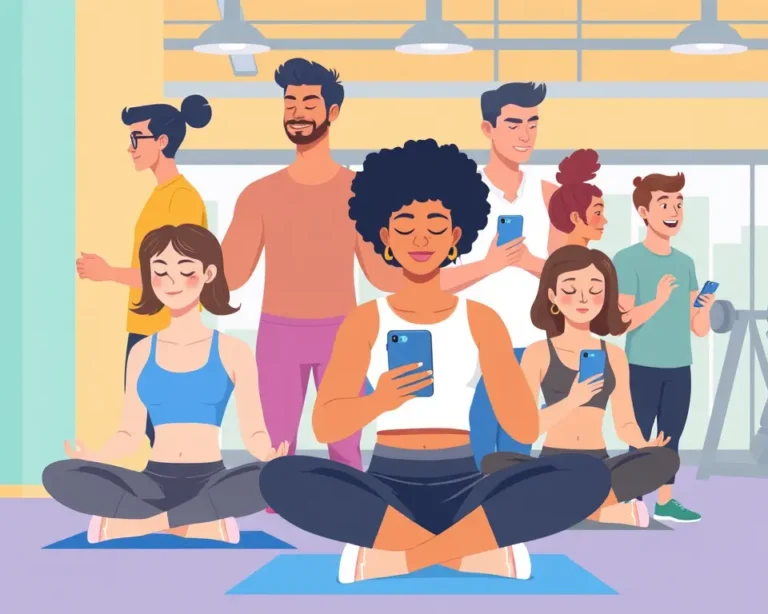Gen Z is reshaping the fitness landscape, bringing a fresh perspective that prioritizes mental well-being alongside physical health. This generation, known for its tech-savviness and social consciousness, is redefining what it means to be fit, turning the gym into a hub for both physical and mental rejuvenation. Let’s dive into the driving forces behind this trend and explore how fitness businesses are adapting to meet the unique needs of Gen Z.
The Rise of Gen Z in the Fitness World
Born between the mid-1990s and early 2010s, Gen Z, often dubbed “Generation Active,” is making significant waves in the fitness industry. They are embracing fitness like never before, engaging in everything from spinning classes to strength training. According to ABC Fitness, a remarkable 73% of this active generation are members or users of health clubs, gyms, or studios. This level of engagement signals a game-changer for the fitness and wellness industry, presenting both opportunities and challenges for businesses looking to capture their attention.
Why the Gym? More Than Just a Workout
For Gen Z, the gym is more than just a place to sweat; it’s a social hub, a community, and a sanctuary for mental well-being.
- Social Connection: A significant portion of Gen Z views working out as a way to socialize. Research indicates that over a third of them see exercise as a social activity, and nearly half have formed new friendships while keeping fit.
- Mental Health Priority: Mental well-being is a top priority for Gen Z’s workout motivation. Studies reveal that almost half of Gen Z gym-goers choose to exercise to support their mental health, with many using workouts to manage stress and regulate their emotions.
- Holistic Approach: Unlike previous generations, Gen Z views fitness as a holistic experience, driven by a desire to maintain mental wellness and be part of a community. Their top reasons for exercising are often linked to health and happiness, demonstrating a strong appreciation for the all-encompassing benefits of physical activity.
Mental Health: A Key Motivator
Gen Z’s emphasis on mental health is transforming the fitness industry. They recognize the strong connection between physical activity and mental well-being, viewing workouts as a way to feel good, not just look good.
Exercise as Therapy
For Gen Z, exercise isn’t just about building muscles or losing weight; it’s a tool for stress relief, emotional regulation, and overall mental wellness. This perspective is driving them to explore fitness programs that integrate mindfulness and mental health support.
Gyms Supporting Mental Wellness
The Gym Group, a nationwide gym chain, found that almost half of 18-24 year old Gen Z gym-goers exercise to support their mental well-being. To meet this need, they’ve launched “Mood Boosting” workouts on their app, offering short, easy-to-follow routines designed to boost endorphins and improve mental state.
The Influence of Social Media
Social media plays a pivotal role in shaping Gen Z’s fitness habits and attitudes. Platforms like Instagram and TikTok are brimming with fitness content, where influencers share workout routines, diet tips, and transformation stories, inspiring millions to hit the gym.
Fitness Trends on Social Media
- Viral Trends: TikTok has birthed trends like “cozy cardio,” “Pilates princess,” and the “30-30-30” method, further fueling Gen Z’s fitness enthusiasm.
- Fitness Challenges: Gen Z loves participating in and sharing their progress on social media challenges, creating a sense of community and friendly competition.
- Influencer Impact: Fitness influencers are essential in the fitness industry’s evolution, bringing attention to physical, mental health, and self-love. Many Gen Zers follow influencers for motivation, inspiration, and tips for a healthier lifestyle.
The Dark Side of Social Media
While social media can be a powerful motivator, it also has potential negative impacts.
- Body Image Issues: Appearance-led social media content can negatively impact body image, leading to comparisons and unhealthy habits.
- Unrealistic Standards: The constant stream of curated fitness content can create unrealistic beauty standards, pressuring young people to achieve unattainable physiques.
- Misinformation: The Butterfly Foundation’s research indicates that a significant percentage of Gen Z are influenced by social media to change their eating habits or fitness routines, with many considering following advice shared by influencers, even if unqualified.
Promoting Positivity
To counter these negative effects, it’s crucial to promote body positivity and inclusivity within the fitness community on social media. Influencers and fitness brands should prioritize qualified advice, mental well-being, and realistic expectations.
Gen Z’s Unique Fitness Preferences
Gen Z’s approach to fitness is anything but one-dimensional. They crave variety, personalization, and convenience in their workout routines.
Diverse Workout Options
From high-intensity group classes to calming yoga sessions, Gen Z explores every fitness corner. They enjoy activities that offer both physical and mental benefits, such as:
- Strength Training: Strength training is a top choice for Gen Z, driving them into the studio for group workouts.
- Yoga and Mindfulness: Yoga provides a balance of physical exercise and mindfulness, appealing to Gen Z’s holistic approach to wellness.
- Outdoor Activities: Hiking, trail running, and open-water swimming align with their preference for environmentally-friendly fitness practices.
Personalized Fitness Plans
One-size-fits-all workouts are a thing of the past. Gen Z prefers personalized fitness plans tailored to their individual goals, whether it’s weight loss, muscle gain, or endurance training. These custom plans often incorporate a mix of cardio, strength training, and flexibility exercises, ensuring a well-rounded approach to fitness.
The Rise of Fitness Apps and Wearables
Gen Z’s affinity for technology extends robustly into their fitness routines. Wearable technology, such as fitness trackers and smartwatches, is widespread among this generation. These devices track physical activity and offer insights into broader health metrics like sleep quality, stress levels, and recovery needs, promoting a more holistic view of health. Fitness apps also offer guided workout routines, personalized training programs, and nutritional advice.
Gyms as Social Hubs
Gen Z is increasingly favoring gyms over traditional pubs for socializing, highlighting a significant shift in social habits. Gyms are becoming social hubs where young people can connect, enjoy a healthier lifestyle, and build communities.
The Social Aspect of Fitness
- Workout Buddies: Gen Z often teams up with friends to stay motivated and accountable. Exercising with a friend makes workouts more enjoyable and less of a chore.
- Group Fitness: Over 80% of Gen Z gym-goers participate in group training, citing the energy of the group, fast results, and the guidance of an instructor as key factors.
- Community Building: Promoting trainers and instructors as local fitness influencers is a high-impact way to create a strong sense of community.
Adapting to the Trend
Fitness facilities are adapting by offering non-alcoholic drinks and wellness-focused experiences to cater to the preferences of health-conscious consumers. This could include hosting immersive evening fitness events featuring live DJs and smoothie bars, appealing to Gen Z’s desire for both community and fitness.
The Untapped Market
Despite their active lifestyle, a significant portion of Gen Z has yet to fully embrace regular exercise. Nurturing this untapped market requires an intimate understanding of the challenges they face.
Barriers to Entry
Gen Zers have grown up watching their parents yo-yo diet, follow fads, and flit from one short-lived fitness kick to another. They also perceive exercise as hard work.
Overcoming Challenges
To engage this untapped market, fitness brands should:
- Provide Support: Offer guidance and support to help Gen Zers get started with their fitness journeys.
- Offer Digital Options: Provide high-quality digital options, as many non-exercisers want to start working out at home first.
- Cut Through the Noise: Gain their attention and build trust by creating engaging content that resonates with their values and interests.
The Future of Fitness with Gen Z
Gen Z will have a bigger impact on the fitness market than any generation before them. Their unique preferences, values, and motivations are reshaping the industry, driving innovation and creating new opportunities for growth.
Key Takeaways for Fitness Businesses
- Embrace Mental Wellness: Prioritize mental health and wellness in your offerings, integrating mindfulness and stress-relief techniques into workout programs.
- Personalize the Experience: Offer personalized fitness plans tailored to individual goals and preferences.
- Leverage Technology: Embrace wearable technology, fitness apps, and virtual reality to enhance the workout experience and provide convenient options.
- Build Community: Create a welcoming and inclusive environment that fosters social connections and supports a sense of belonging.
- Engage on Social Media: Utilize social media to connect with Gen Z, sharing engaging content and promoting body positivity.
- Be Authentic: Stay true to your brand values and build trust with your audience by providing qualified advice and promoting realistic expectations.
By understanding and catering to Gen Z’s unique needs and preferences, fitness businesses can unlock their potential and drive sustained success in the ever-evolving fitness landscape.







